
How to Find and Hire Full Stack Developers in 2025
Finding and hiring the right full-stack developers in 2025 can be a game-changer for your business.
This comprehensive guide provides a step-by-step approach, best practices, and key strategies for overcoming challenges in the hiring process.
Whether you’re expanding your team or starting a new custom software development project, this guide will help you find top talent and drive your business forward in the digital age. Get ready to transform your business with a team of full-stack developers that will drive innovation and growth!
Contents
- Who is a full stack developer?
- Full-stack developer types
- IT jobs market trends and statistics
- When to hire full stack developer?
- Essential skills of an experienced full stack developer
- How to interview full stack developers?
- How to hire a full stack developer: step by step
- Advantages of hiring full stack developers
- Challenges when hiring full stack developers
- How much does it cost to hire a full-stack developer?
- Where to look for full stack developers?
- Hire full stack developers with Stratoflow
Who is a full stack developer?
A full-stack developer is a technology professional who has the knowledge and skills to work on both the front-end and back-end components of a web application.
Think of a website or app; the front-end is everything you see and interact with, like the layout and buttons. It typically involves working with HTML, CSS, and JavaScript.
The back end, on the other hand, is everything that happens behind the scenes – the server, database, and application logic. It’s usually built using languages like Python or Java and supporting frameworks like Spring, Vaadin, or Angular.
A full-stack developer knows how to work in both areas.
A full-stack developer is a bit like a Swiss Army knife in the world of software development. They are skilled professionals who can handle both front-end and back-end tasks.
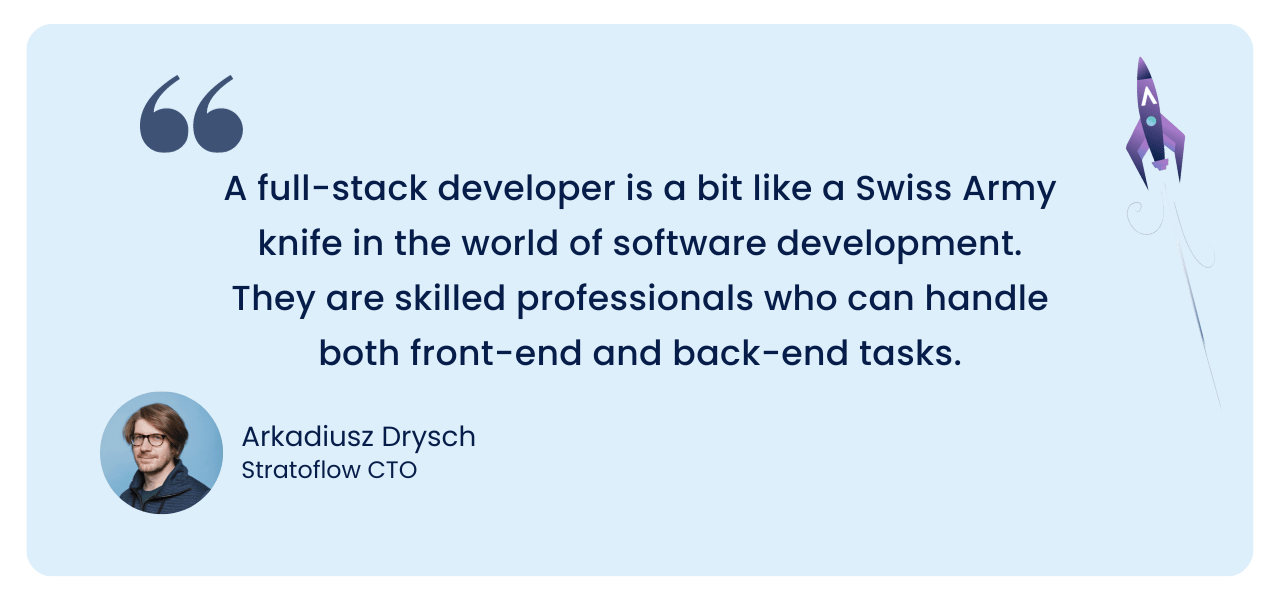
Full-stack developers are able to handle database management, server programming, and client-side coding, providing a comprehensive approach to web application development. They are proficient in a variety of programming languages and frameworks, and understand how the client-side and server-side parts of an application interact.
This versatility makes them extremely valuable in building complete web applications. They are like all-in-one experts who can take a project from idea to finished product.
Full-stack developer types
To better understand the different types of full-stack developers, we must first understand the tech stack.
What is a tech stack?
In a nutshell, it is an essential toolkit for software developers – each of which may help achieve similar goals, but their approach is vastly different.
Think of it as different sets of brushes used by painters. If they need to cover a large area with paint quickly, they choose a large and thick brush. When they need to create a small painting with lots of fine detail, they use a small, precise brush.
And just as there are many sets of brushes, there are many sets of programming languages and supporting technologies that a full stack developer can master.
Let’s take a quick look at the main types of full stack programmers and the technologies used in full stack development.
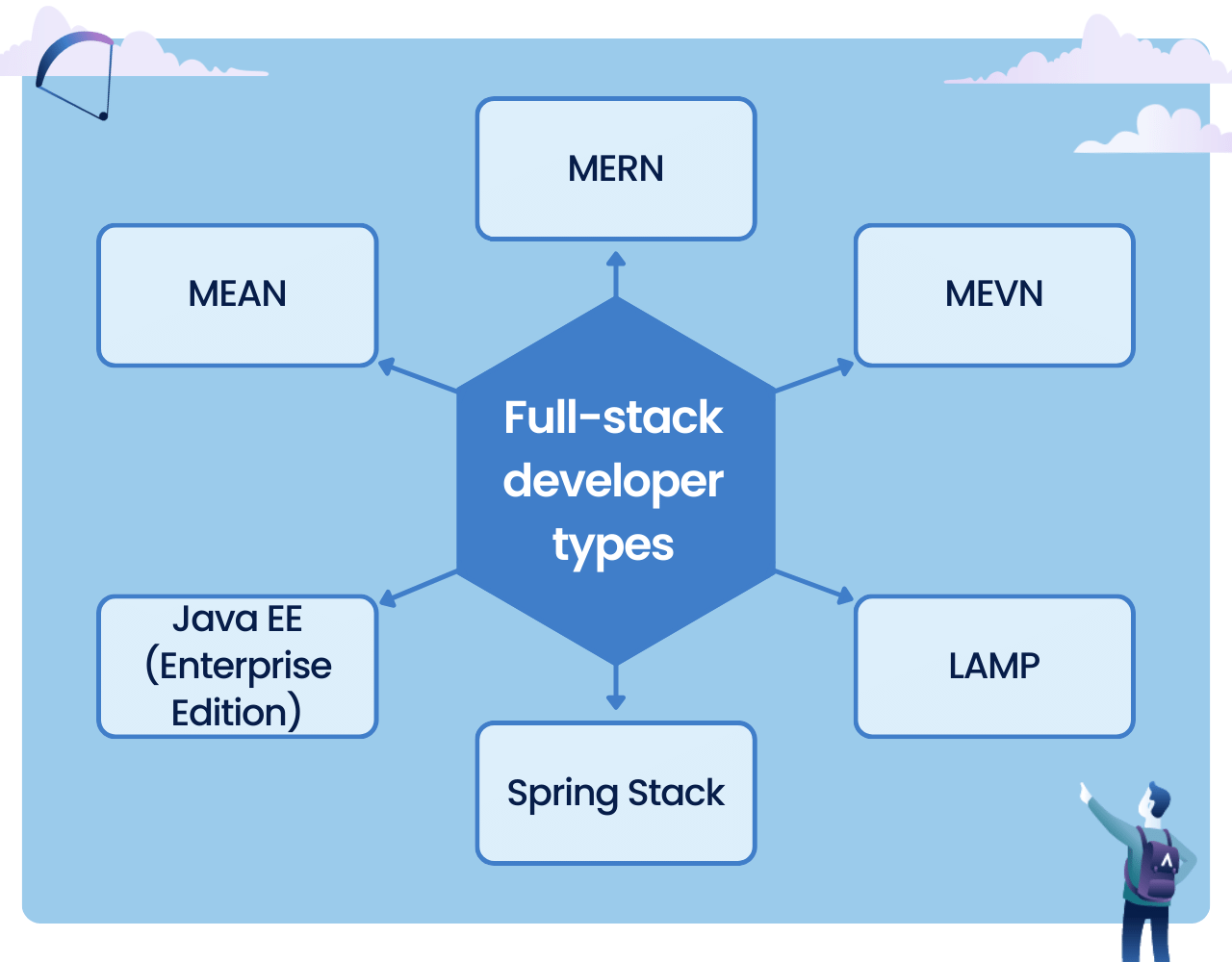
MEAN
This technology stack includes MongoDB, Express.js, AngularJS, and Node.js.
It’s a JavaScript-based stack that’s perfect for building fast and scalable web applications. MongoDB provides a flexible NoSQL database, Express.js manages the backend, AngularJS enables efficient front-end development, and Node.js provides a runtime environment.
MERN
Similar to MEAN, this stack uses MongoDB, Express.js, React, and Node.js.
The key difference is the use of React for front-end development, which provides a more robust framework for building user interfaces.
MEVN
This is another variation of MEAN, where AngularJS is replaced with Vue.js.
Vue.js is gaining popularity for its ease of use and integration, making MEVN a preferred stack for many full stack engineers looking for performance and flexibility.
LAMP
Standing for Linux, Apache, MySQL, and PHP (or Perl/Python), this stack is one of the oldest and most reliable.
It’s great for dynamic websites and applications. Linux serves as the operating system, Apache as the web server, MySQL as the relational database, and PHP, Perl, or Python as the scripting language.
Spring Stack
This is the most popular Java tech stack for enterprise and web app development that includes the Spring Framework – a powerful and versatile framework used for building Java applications. With its vast ecosystem, it supports various project needs from simple web applications to complex, high-performance system architectures.
Java EE (Enterprise Edition)
This stack is a standardized platform for building enterprise-grade applications in Java.
It includes a set of specifications and extends the Java SE (Standard Edition) with specifications for enterprise features such as distributed computing and web services.
[Read also: How to Find Software Developers in 2025? 10 Experts Tips]
Freelance full stack developers vs full-time developer
Freelance full-stack developers and in-house full-stack developers both perform a wide range of web and application development tasks, but their work arrangements and roles differ significantly.
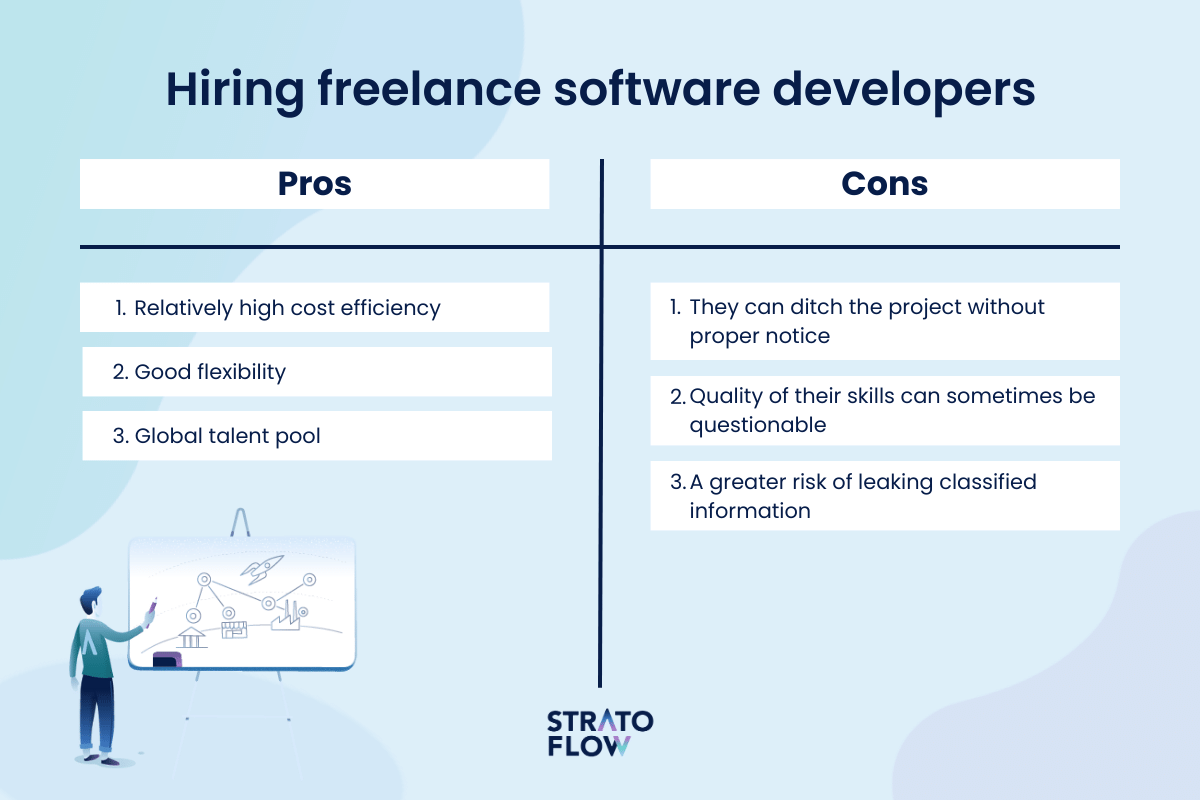
Freelance full-stack developers are independent contractors who often work on a project-by-project basis for a variety of clients. They offer flexibility, a diverse skill set, and are ideal for short-term or varied projects. Dedicated developers, on the other hand, are typically employed by a single company and work exclusively on their projects.
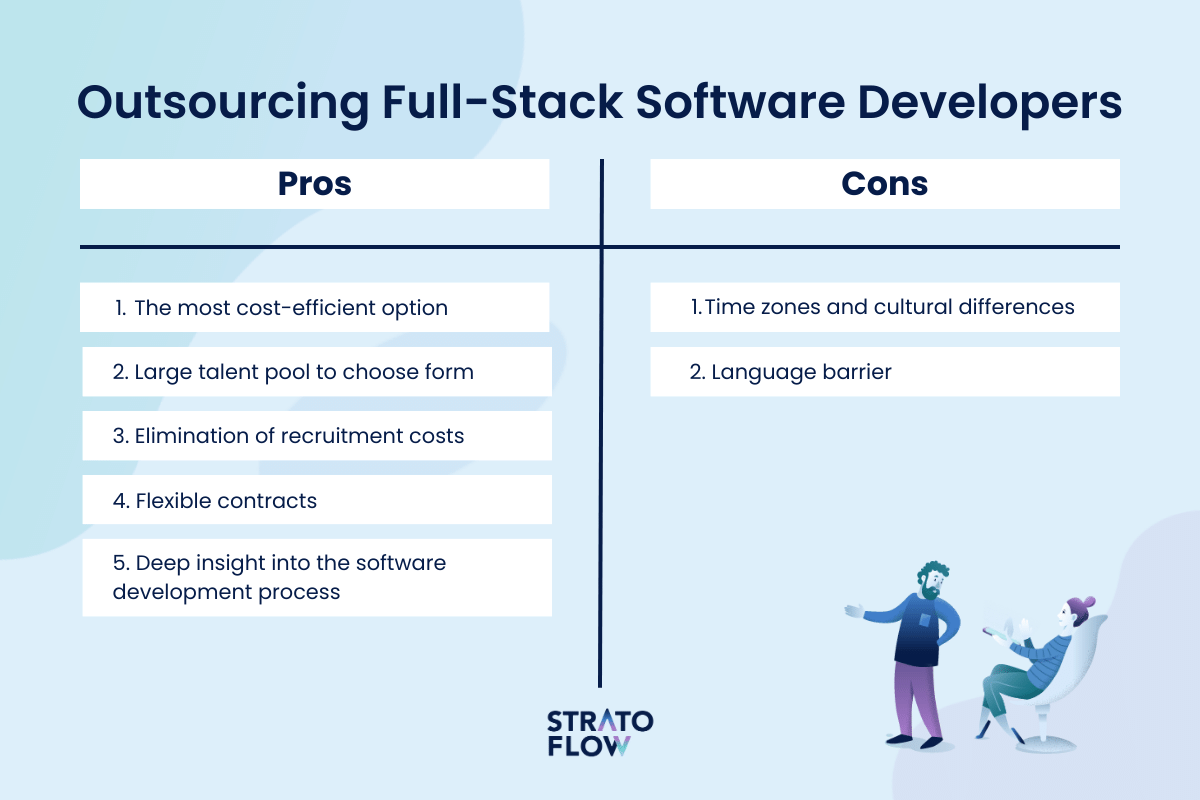
They provide deep, consistent involvement in projects and have a deep understanding of the company’s long-term goals and technology needs. While freelance full stack developers bring fresh perspectives and diverse experience, dedicated developers provide stability and a focused approach to a company’s ongoing projects and needs.
IT jobs market trends and statistics
As industries push to further adopt digital technologies, IT professionals have become some of the most in-demand members of today’s workforce, and as we enter 2025, more and more companies are aggressively pursuing the integration of AI into a wide range of technology products and business workflows.
But that doesn’t mean things have always been so perfect in the software development industry.
2023 has seen a big wave of layoffs as some of the largest tech companies in the world have laid off thousands of highly skilled employees due to cost-cutting.
According to the latest data over 810 large tech companies have cut more than 240,000 jobs in 2023, a total that’s already 50% higher than the previous year. The layoffs were driven by the biggest names in tech like Google, Amazon, Microsoft, Yahoo, and Meta. But despite these disruptions in the tech sector in 2023, many tech workers have found new roles within the industry, indicating a resilient job market.
The most in-demand tech jobs for 2023 include cloud engineers, full-stack developers, and security professionals underscoring which fields are the most crucial in today’s economy.
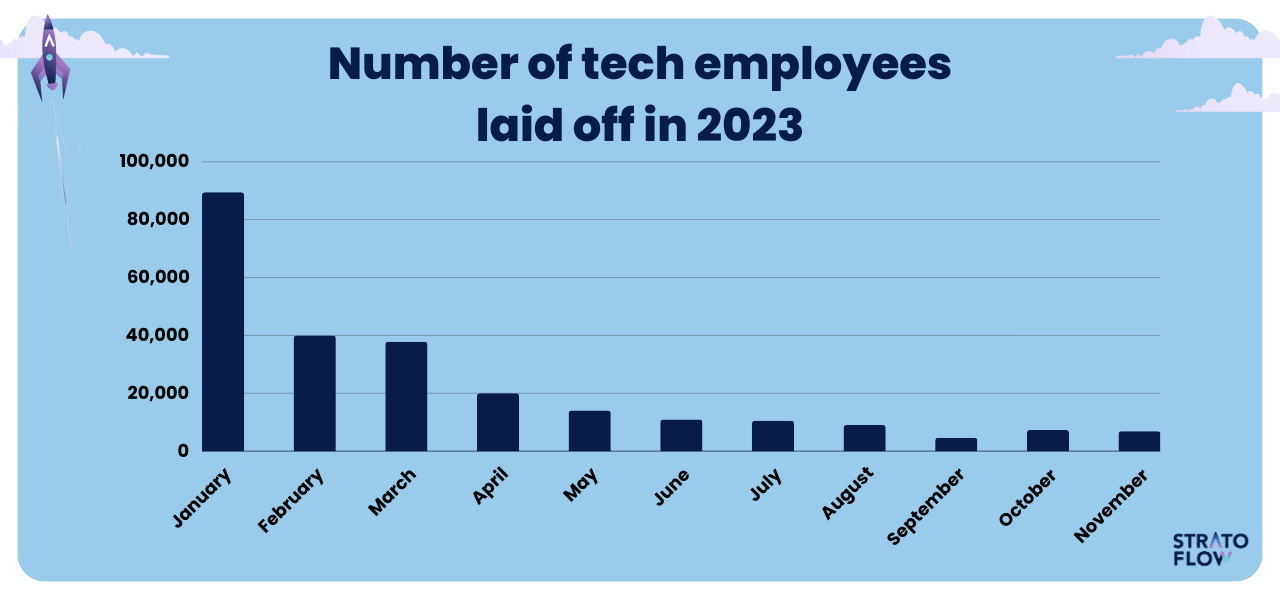
Tech jobs continue to offer competitive salaries, with companies likely to maintain or even increase compensation to attract top talent.
For example, as of May 2022, the median annual wage for web and digital interface designers is $83,240, data engineers earn an average salary of $109,675, and software developers $127,260. About 377,500 openings are projected each year, on average, in these occupations due to employment growth and the need to replace workers who leave the occupations permanently. The Bureau of Labor Statistics on the other hand predicts about 189,200 job openings for full-stack developers every year between 2020 and 2030.
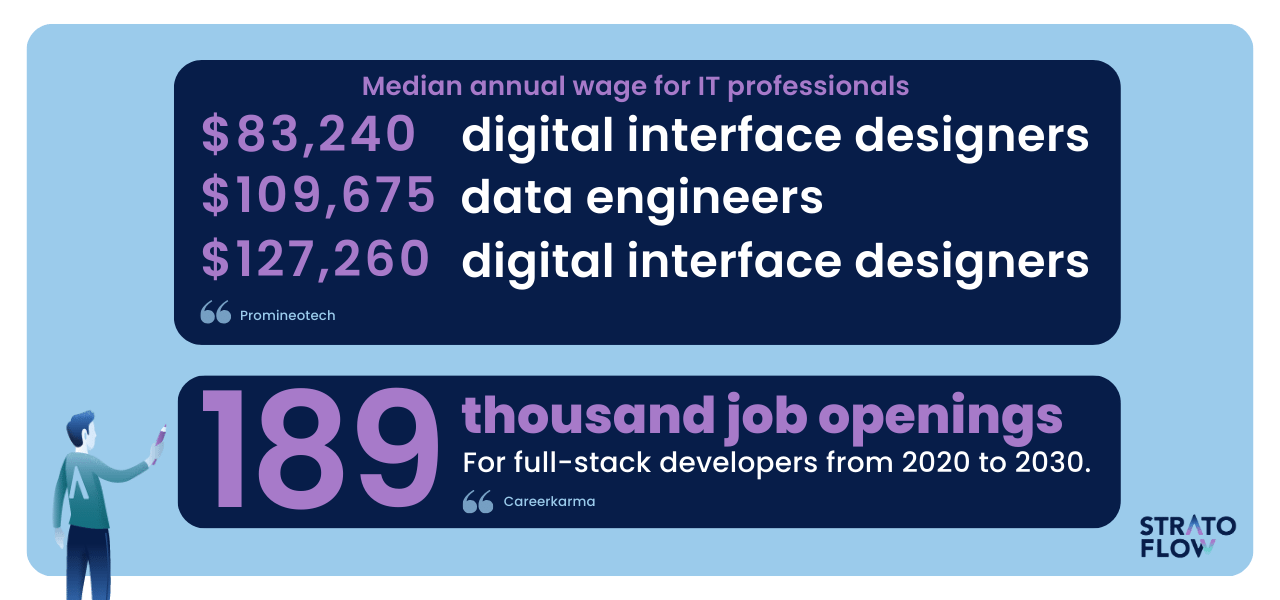
When to hire full stack developer?
From a business perspective, deciding when to hire talented full stack developers can be critical to both expanding your insourcing and outsourcing team.
If your project involves both front-end and back-end development, and you’re looking for a streamlined, cohesive approach, bringing a full stack developer on board is a smart choice.
Experienced full stack developers are especially valuable if you’re looking to develop a minimum viable product (MVP) or a smaller application, where a single, versatile individual or team can speed development and reduce costs. In addition, if your existing team has specialized developers but lacks someone who can oversee and connect all parts of the project, an experienced full stack developer can fill that gap and ensure smooth integration and functionality.
For companies considering software outsourcing, hiring full stack developers from a reputable company becomes critical when you need fast, efficient, and comprehensive development solutions without the burden of managing a large team.
Their broad skill set, adaptability, and experience in handling various aspects of development make them ideal for projects where time, quality, and budget are of the essence. In essence, the decision to hire full stack developers can be a strategic move for companies looking to innovate, scale, and maintain a competitive edge in the marketplace.
Essential skills of an experienced full stack developer
An experienced full-stack developer possesses a diverse set of skills that are crucial for the successful development and deployment of software applications. Here’s a list of essential skills and why they are important:
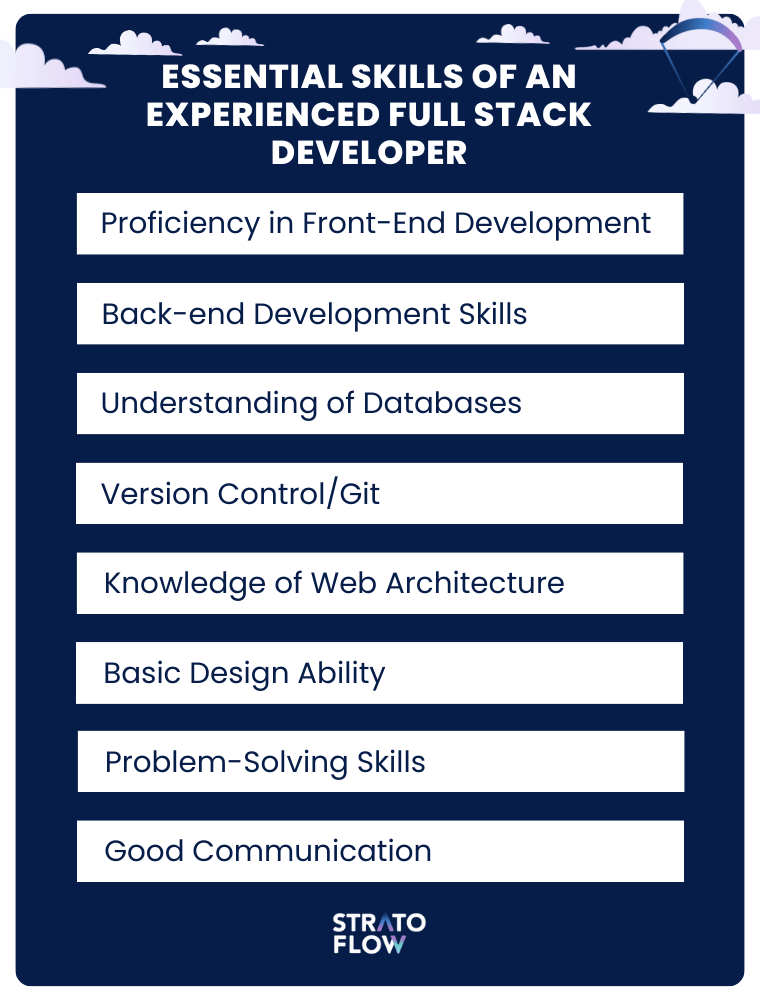
Proficiency in Front-End Development Technologies
Knowledge of basic front-end technologies such as HTML, CSS, and JavaScript is essential for a full stack developer.
HTML structures the content on the page, CSS styles it, and JavaScript adds interactivity. These technologies are the building blocks of the user interface, and expertise in them ensures that the application is not only functional, but also user-friendly and visually appealing. An experienced full stack developer should also be familiar with front-end frameworks such as React or Angular to speed up and improve the software development lifecycle.
Back-end Development Skills
With the front end covered, let’s move on to the back end, as a solid understanding of back-end languages such as Python, Java, or PHP is also critical for full stack developers.
These skills allow the developer to efficiently handle server-side logic, manage databases, and ensure that user requests are met with the correct responses. They should understand how to create APIs, manage server requests, and integrate with other services. These skills are critical to the functionality of Web applications, handling everything from user authentication to data processing.
Understanding of Databases
Databases are where all of your application’s data lives. Whether it’s user profiles, product information, or reviews, an experienced full stack programmer needs to know how to store and retrieve it efficiently.
That’s why knowledge of database technologies like SQL or MongoDB is essential for full stack developers to store, retrieve, and manipulate data. Efficient database management ensures that the application runs smoothly and that data integrity is maintained.
Version Control/Git
Knowledge of version control, especially Git, is vital for any software developer so it is nop surprise why it has a spot on this list.
It allows developers to track and manage changes to the codebase, collaborate with others without overwriting each other’s work, and revert back to previous versions if something goes wrong.
Knowledge of Web Architecture
Another key skill for full stack developers is knowing how to structure a project, separate concerns, and write clean code.
Experienced developers know how to organize files, use design patterns, and create a robust architecture that allows the application to grow and adapt over time without becoming a tangled mess.
This is the skill that separates ordinary programmers from full stack professional developers – the ability to take on even the most robust enterprise software development projects and keep them well maintained for years to come.
Basic Design Ability
Although they are not graphic designers, full stack developers benefit from an understanding of basic design principles.
This means they can make quick adjustments, understand UX/UI principles, and contribute to the overall aesthetic and user experience of the application. A good developer should be able to translate a designer’s vision into a functional product.
Problem-Solving Skills
Coding challenges and unexpected bugs are the norm for a full stack developer.
A full stack developer with strong problem-solving skills can think critically and logically, break down complex problems into manageable parts, and apply systematic approaches to find solutions. These skills are essential for efficient debugging and innovative solution development.
Good Communication
Full stack developers must communicate effectively with team members, stakeholders, and customers.
This includes explaining technical concepts in understandable terms, understanding requirements and feedback, and discussing timelines and issues. Good communication helps avoid misunderstandings and ensures that the project meets its goals.
Attention to Detail
In software development, even a small mistake can cause big problems.
Full stack developers with a keen eye for detail are more likely to catch bugs early, follow best practices, and ensure that the user interface is pixel-perfect. This attention to detail leads to higher quality code and a better end product that keeps everyone happy-development team and customers alike.
Understanding of Security Practices
Last but not least, we need to talk about security, because with cyber threats on the rise, understanding basic security principles is essential.
Full stack developers should know how to protect against common vulnerabilities such as SQL injection, XSS, and CSRF. They should implement best software development security practices such as encryption, strong authentication, and regular security updates to protect the application and user data.
How to interview full stack developers?
Interviewing full stack developers requires a strategic approach to ensure they meet your company’s needs and will be a valuable addition to your team.
Start by reviewing their portfolio and past projects to get a sense of their experience and expertise. This initial screening will help you understand their knowledge of both front-end and back-end technologies.
During the interview, ask technical questions that cover a range of topics, from HTML, CSS, and JavaScript to server-side languages and database management.
It’s also important to discuss their previous work experience and roles to understand their ability to work independently and as part of a team. Ask about their contributions to past projects and how they handled conflicts or challenges. Ask about their learning habits and how they keep up with the latest industry trends and technologies.
Beyond technical skills, evaluate their cultural fit. A developer who aligns with your company’s values, work ethic, and team dynamics is more likely to thrive and make a positive contribution.
Remember that a successful interview should be a two-way conversation.
Give the candidate ample opportunity to ask questions about the role, team, projects, and company culture. This not only helps them assess their fit, but also demonstrates your company’s openness and support for team members. By combining a thorough technical assessment with a holistic view of their soft skills and alignment with your company culture, you can effectively determine if a full stack developer will be a valuable and harmonious addition to your team.
How to hire a full stack developer: step by step
Hiring a full stack developer requires a structured and thoughtful approach.
Each step, from identifying your project needs to making the final hiring decision, plays a critical role in finding the right talent that aligns with your business goals.
Here’s a detailed, step-by-step guide that outlines the essential stages in the process of hiring a full stack developer through a custom software development company.
[Read also: How to Hire Dedicated Developers – Your Ultimate Guide]
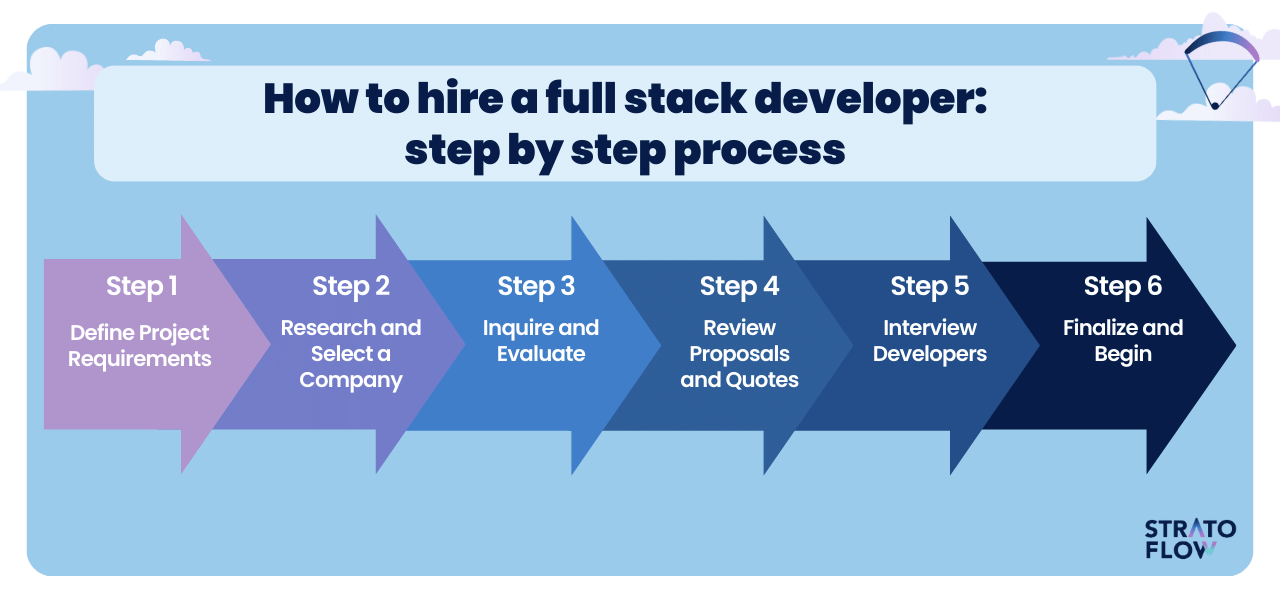
Step 1: Define Project Requirements
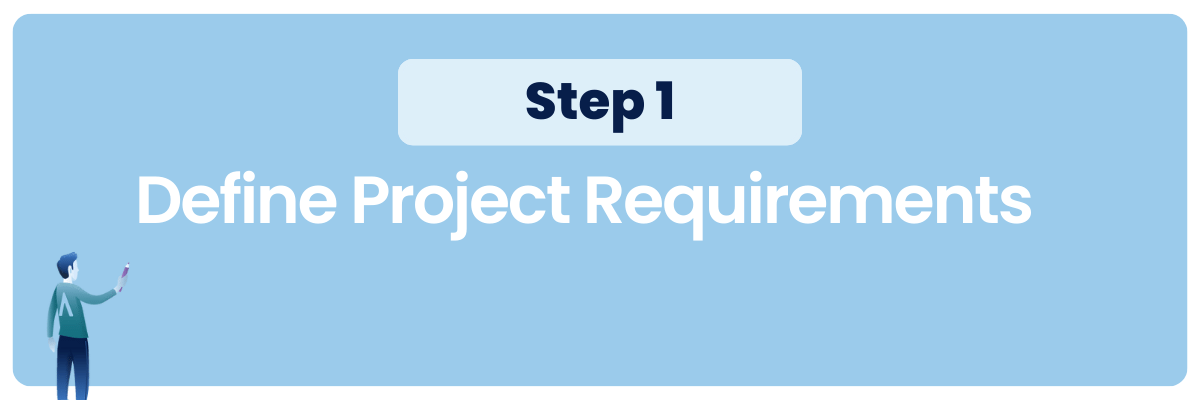
Start with a thorough understanding of what you need.
List the specific goals, scope of work, and technical requirements of your project. Consider what platforms and technologies will be used, the size of the application, and any unique features you want.
It’s also important to identify the key skills and experience your full stack developer should have. The clearer you are at this stage, the easier it will be to communicate your needs to the software development company.
Step 2: Research and Select a Company
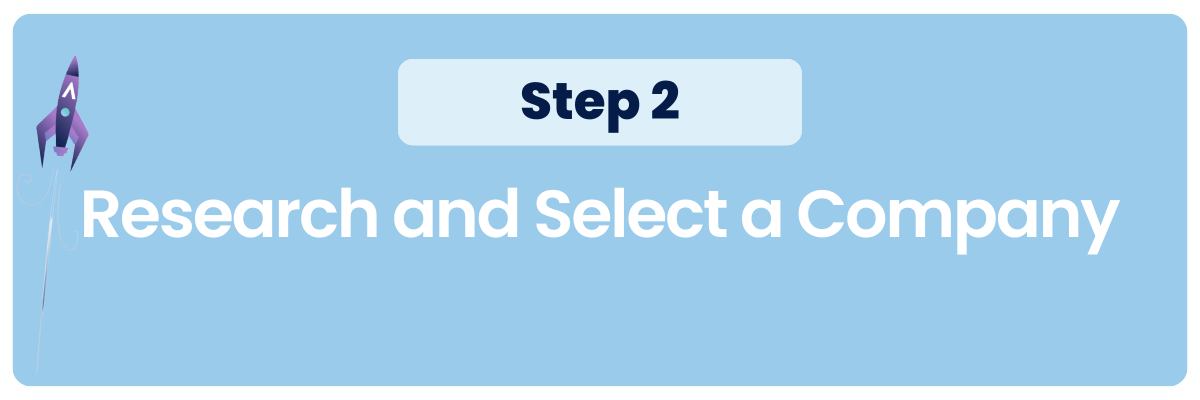
When hiring best dedicated full stack developers look for outsourcing companies with a strong portfolio and a history of delivering quality work.
Read reviews and testimonials from their past clients to gauge their reputation. Also consider whether they have experience in your industry and with the technologies your project requires. It’s a good idea to create a shortlist of several companies so you can compare and choose the best fit for your needs.
Step 3: Inquire and Evaluate
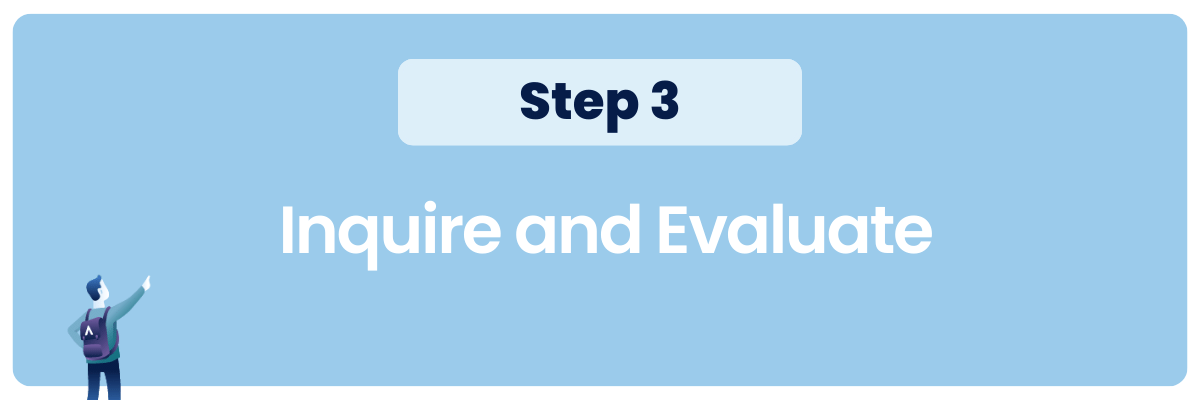
Reach out to the companies on your shortlist with a brief about your project and request their proposal.
This is also the time to ask questions and clarify any doubts.
Pay attention to how they communicate and whether they show a genuine understanding of your project and needs. Evaluate their proposed solution, timeline, and how they plan to tackle your project. The right company should not only have the technical capability but also a collaborative approach.
Step 4: Review Proposals and Quotes
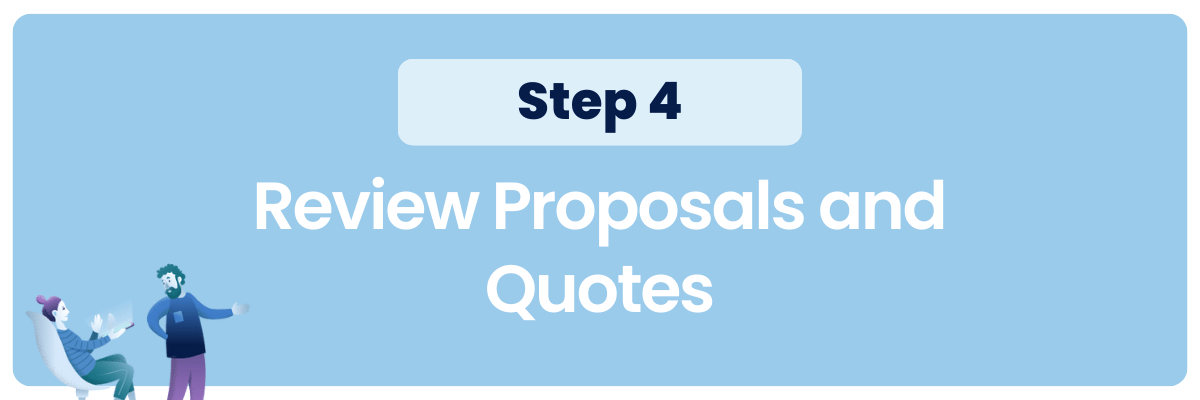
Once you receive proposals, take your time to review them thoroughly.
Look beyond just the price; consider the value they provide, their proposed approach, and the quality of their previous work. A lower cost might be appealing, but it’s the overall value and alignment with your goals that truly matter. Assess the transparency of their quote and whether it covers all aspects of your project.
Step 5: Interview Developers

Even though you’re hiring through a company, it’s wise to meet or at least have a call with the full stack developers who will be directly working on your project.
This step helps you understand their level of expertise, problem-solving skills, and whether they have good communication skills. Ask about their previous projects, how they handle challenges, and their approach to staying updated with the latest technologies. This ensures you’re comfortable with the team and confident in their abilities.
Step 6: Finalize and Begin Development
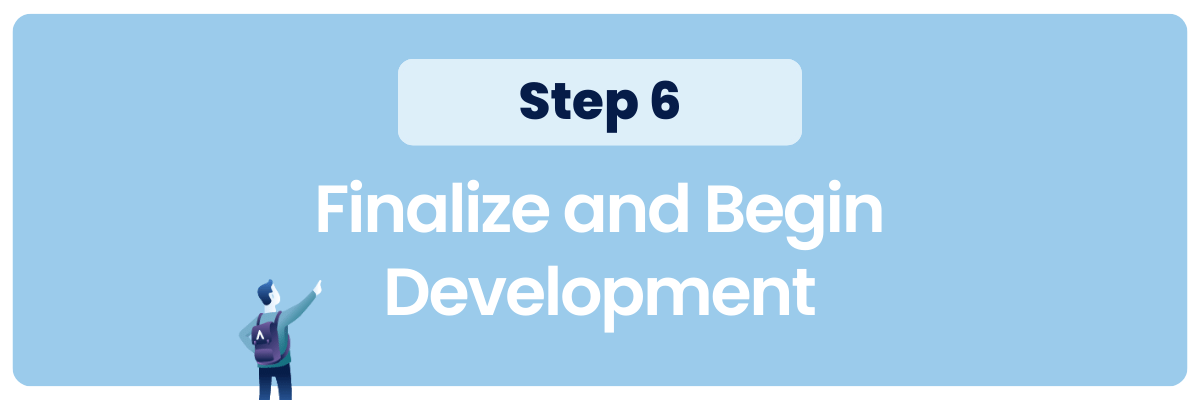
Once you’re comfortable with the company and the team, it’s time to finalize the deal.
Review the contract carefully, paying particular attention to the scope of work, payment terms, non-disclosure agreements, and the process for handling any changes or issues that may arise. Once everything is agreed upon, sign the contract and schedule an initial meeting to kick off the project. This meeting should reiterate the project goals, discuss the workflow, and establish clear communication channels to ensure a smooth collaboration.
Advantages of hiring full stack developers
When considering expanding or enhancing your development team, the decision to hire full stack developers comes with a multitude of benefits.
A skilled full stack developer has the versatility to handle both client-side and server-side tasks, but also brings a deep understanding of the entire tech stack to the table.
Understanding these benefits can help you make an informed decision about adding these skilled individuals to your team. Let’s take a quick look at them:
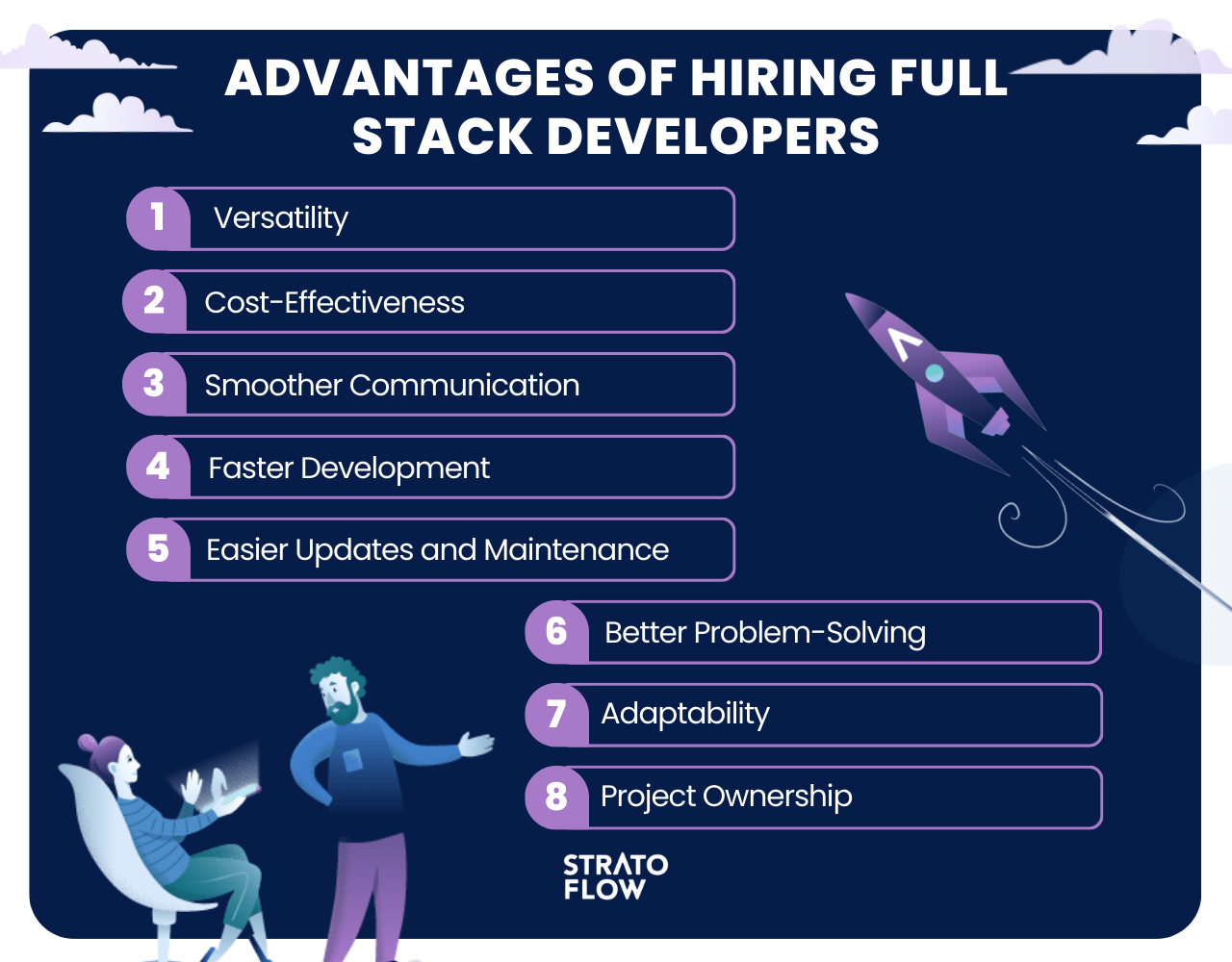
Versatility
Top full stack developers are well-versed in both front-end and back-end technologies.
This means they can handle various aspects of development, from the user interface to the server-side functionalities. Their wide skill set is particularly useful for small to medium-sized projects where versatility is key.
Cost-Effectiveness
Hiring one full stack developer who can navigate both the front and back ends can be more cost-effective than hiring multiple specialized developers. This approach reduces the overhead costs associated with additional employees while maintaining high-quality development standards.
Smoother Communication
With a broader understanding of various technologies, full stack developers can serve as effective communicators between different teams in a project. This leads to more efficient problem-solving and decision-making as there’s less chance of miscommunication between specialized departments.
Faster Development
Full stack developers can work on different parts of an application simultaneously, speeding up the development process. Their ability to switch between front and back-end tasks without waiting for another team member to finish can lead to faster completion of the project milestones.
Easier Updates and Maintenance
Having one developer or a team of developers who understand the entire architecture of the application makes it easier to implement updates and maintain the system. Full stack developers can identify and address issues across the entire stack, leading to more streamlined and effective maintenance.
Better Problem-Solving
Full stack developers have a comprehensive view of the technological aspects of a project, which allows them to foresee potential problems and address them proactively. Their broad expertise enables them to come up with creative and effective solutions.
Adaptability
Technology trends and tools evolve rapidly. Full stack developers, accustomed to learning and working with various technologies, can adapt quickly to new tools and practices, ensuring that your project doesn’t fall behind due to outdated technology.
Project Ownership
Full stack developers are capable of taking complete ownership of the project from conception to deployment and beyond. This holistic approach ensures continuity and consistency throughout the development process, leading to a more cohesive and high-quality product.
[Read also: Off the Shelf vs Custom Software: Pros & Cons + Examples]
Challenges when hiring full stack developers
While the prospect of hiring full-stack developers is filled with potential, it inevitably comes with its own set of challenges. Let’s take a quick look at the key challenges of finding the perfect full stack developer so you can be properly prepared.
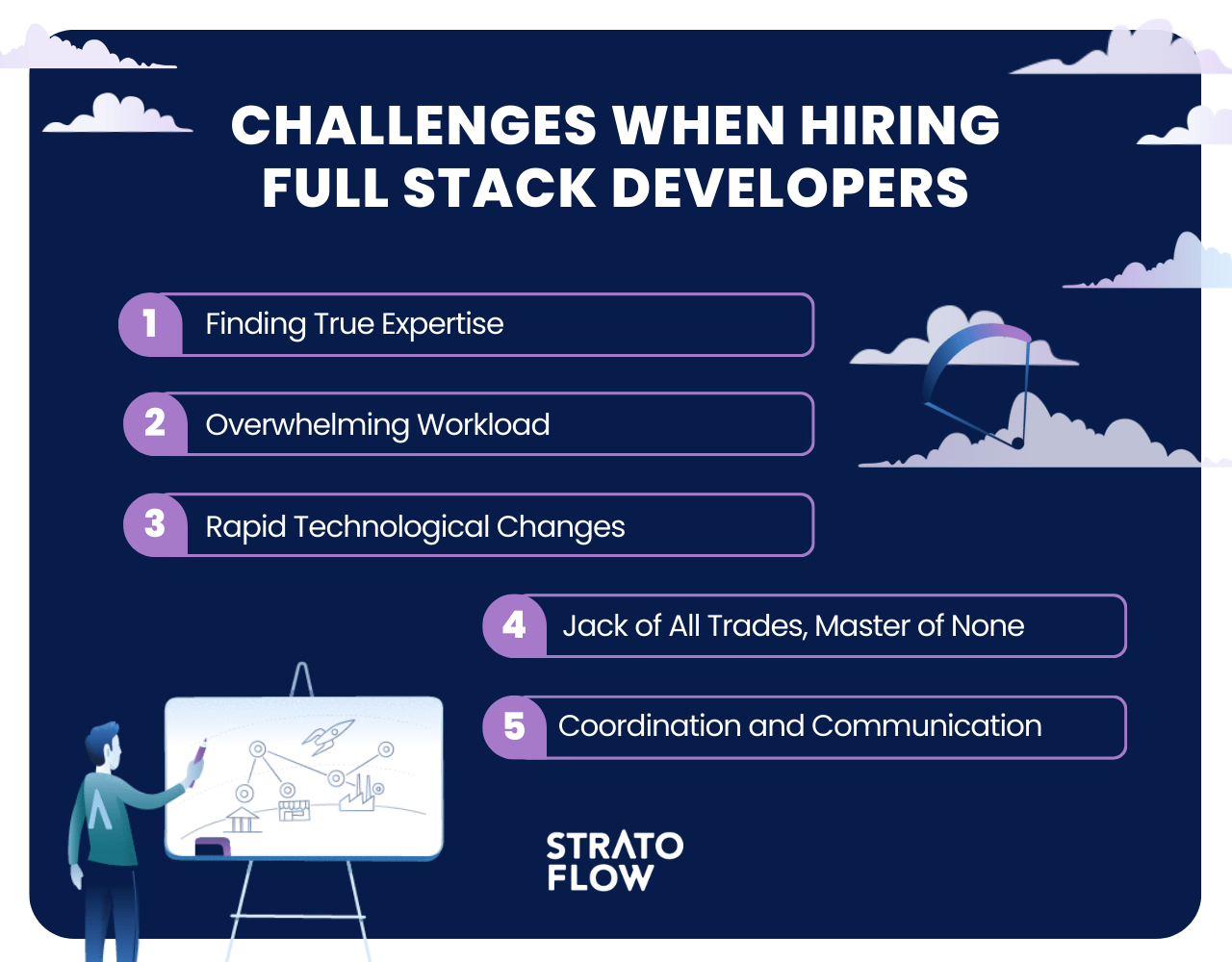
Finding True Expertise
Full stack developers cover a wide range of technologies, but it can be challenging to find individuals who are truly proficient in all the necessary areas. Some may be stronger in either front-end or back-end, which might not meet the specific needs of a complex project.
Overwhelming Workload
Full stack developers are expected to handle multiple aspects of a project, which can lead to an overwhelming workload, especially in larger or more complex projects. This might affect the quality of work or lead to burnout if not managed properly.
Rapid Technological Changes
The tech industry evolves rapidly, and keeping up with the latest trends and technologies can be daunting. Full stack developers need continuous learning to stay relevant, and not all may have the time or resources to keep up, potentially leading to outdated practices.
Jack of All Trades, Master of None
While full stack developers have a broad knowledge base, they might lack deep expertise in specific areas compared to specialized developers. This might be a drawback for projects requiring advanced knowledge in certain technologies.
Coordination and Communication
Although full stack developers can communicate across disciplines, coordinating complex projects single-handedly can be challenging. Miscommunications can occur, especially in teams where other members are highly specialized.
[Read also: Introduction to IT staff augmentation]
How much does it cost to hire a full-stack developer?
The cost to hire full stack developers can vary widely based on several factors, including their experience, geographical location, the complexity of the project, and the market demand for their skills. Here’s a general overview:
Hourly Rates Based on Experience and Location:
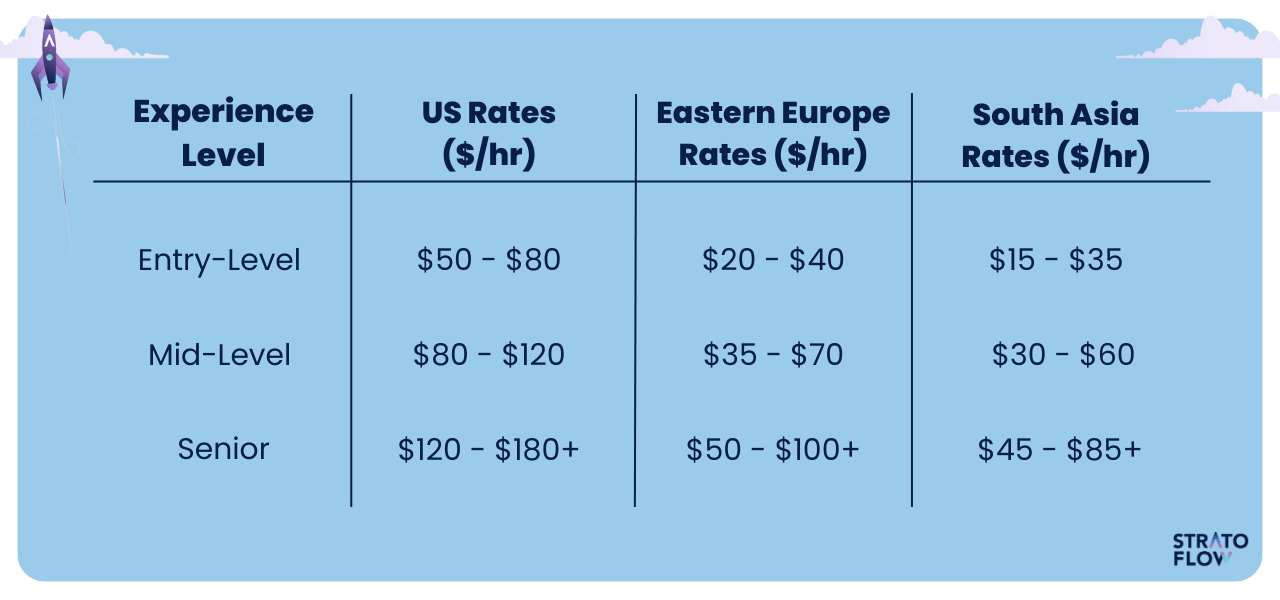
- Entry-Level Full Stack Developer:
- In the US, they might charge anywhere from $50 to $80 per hour.
- In Eastern Europe, rates might range from $20 to $40 per hour.
- In South Asia, rates can be as low as $15 to $35 per hour.
- Mid-Level Full Stack Developer:
- In the US, rates can range from $80 to $120 per hour.
- In Eastern Europe, expect $35 to $70 per hour.
- In South Asia, rates might be around $30 to $60 per hour.
- Senior Full Stack Developer:
- In the US, rates can go from $120 to $180+ per hour.
- In Eastern Europe, $50 to $100+ per hour.
- In South Asia, $45 to $85+ per hour.
Cost of Custom Software Projects:
The cost of software development projects can range significantly based on the project’s scope, complexity, and duration.
Project size
Simple software development projects might include basic web applications or minimum viable products (MVPs) with standard features and their costs can range from $10,000 to $50,000. Larger ones often involve more sophisticated applications with custom coding, API integrations, or moderate data processing needs. Here costs can escalate to between $50,000 and $200,000. When talking about large, enterprise-grade software projects involving advanced features like AI, machine learning, high-volume data processing, or extensive custom development, cost anywhere from $200,000 to $500,000 or more.
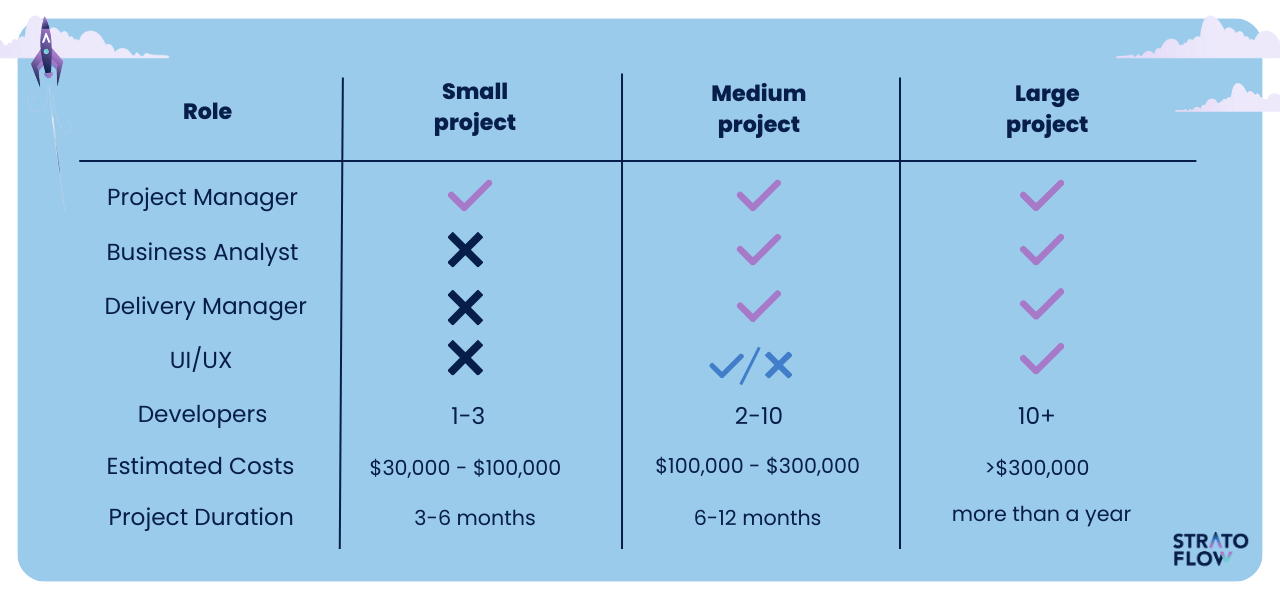
Project phases
Understanding the different phases of development is crucial in estimating the cost of custom software projects. Each phase of the full stack development process, from initial planning to final deployment, involves distinct activities and resource allocations, impacting the overall budget.
- Software Development Planning Phase: Involves requirement gathering, feasibility studies, and planning. It can constitute about 5-10% of the total project cost.
- Design Phase: Includes creating wireframes, mockups, and user interface designs. This phase might account for 10-20% of the overall costs.
- Development Phase: The most labor-intensive phase of full stack development process, involving the actual coding. This can take up 40-70% of the total budget.
- Software Testing and Deployment Phase: Involves ensuring the software is bug-free and deploying it to the live environment. This could take up 10-20% of the budget.
- Maintenance and Updates: Post-launch support and updates can add ongoing costs, typically a yearly fee of around 10-20% of the initial development cost.
Team composition
The composition of the development team plays a significant role in determining the cost of full stack development projects.
Even when employing versatile full stack developers capable of handling various aspects of the project, the inclusion of other specialized roles cannot be overlooked.
For example, project managers are critical to ensuring that the project stays on track, within budget, and on schedule. They act as a bridge between the technical team and stakeholders, facilitating clear communication and quick resolution of issues.
Business analysts, on the other hand, are key to understanding and translating business requirements into technical specifications, ensuring that the final product meets business objectives.
While a larger team with these specialized roles will increase the cost of the project, it can significantly improve the quality, efficiency, and overall success of the project, providing a better return on investment in the long run.
Outsourcing full stack developers as a cost-effective alternative
Outsourcing the software development process can significantly lower the cost of development. Companies often outsource to regions like Eastern Europe, South Asia, or Latin America where the talent pool is vast, and the hourly rates are much lower compared to North American or Western European rates.
For instance, a project costing $300,000 if developed entirely in the US might be reduced to around $100,000 or less if outsourced to Eastern European countries like Poland considering the lower hourly rates.
However, while outsourcing can greatly reduce costs of full stack development, it’s also important to consider factors like time zone differences, cultural barriers, and communication challenges, which can impact the project’s progress and quality.
In summary, the cost to hire full-stack developers and the overall project cost can vary greatly. Companies need to balance the quality, time, and budget considerations when deciding whether to hire locally or outsource.
[Read also: How to Prepare for Outsourcing Software Development?]
Where to look for full stack developers?
When searching for full stack developers, especially if you prefer working with custom software development companies over freelancers, there are several avenues to explore.
A great starting point is Clutch, a reputable platform where you can find detailed profiles of numerous development companies, along with ratings and reviews.
Here you can examine each company’s track record, review client testimonials, and delve into case studies that showcase their expertise and the types of projects they’ve successfully completed. These insights are invaluable in understanding the company’s capabilities and reliability. In addition, it’s important to consider companies with experience in your specific field or industry.
When hiring a full stack developer, looking for a company that has already overcome the unique challenges and requirements of your industry can provide tailored solutions and insights that lead to a more successful collaboration.
By thoroughly evaluating these aspects, you can confidently select a full stack development company that aligns with your project needs and business goals, ensuring a partnership that drives innovation and growth.
Hire full stack developers with Stratoflow
Do you need to hire full stack developers?
Leverage Stratoflow‘s robust experience in building cutting-edge, high-performance and scalable custom software solutions!
Our track record of creating systems capable of processing over a billion financial transactions in an hour is a testament to our ability to handle complex and large-scale projects. Our full stack developers have over a decade of experience, are dedicated to engineering excellence, and offer agility and deep technical knowledge.
Partner with us to turn your vision into reality and enjoy a seamless and accelerated development process!
Conclusion
By the end of this guide, you’ll be equipped with the knowledge and strategies needed to effectively find and hire full-stack developers in 202.
From understanding the benefits and challenges to choosing the right partner with the best full stack developers, you’ll be ready to make informed decisions that will enhance your team’s capabilities and drive your projects to success. Use these insights and you’ll be well on your way to securing the talent that meets your organization’s evolving needs and ambitions.
Related Posts
- How To Hire Dedicated Developers in Europe [Benefits & Models]
- Software Development Process: Complete 2025 Guide
- How to Start a Staffing Agency: A Comprehensive 2024 Guide
- What You Need to Know About Custom Software Development in 2024
- How to Choose a Software Development Company in 2024 [CHECKLIST]
Thank you for taking the time to read our blog post!


